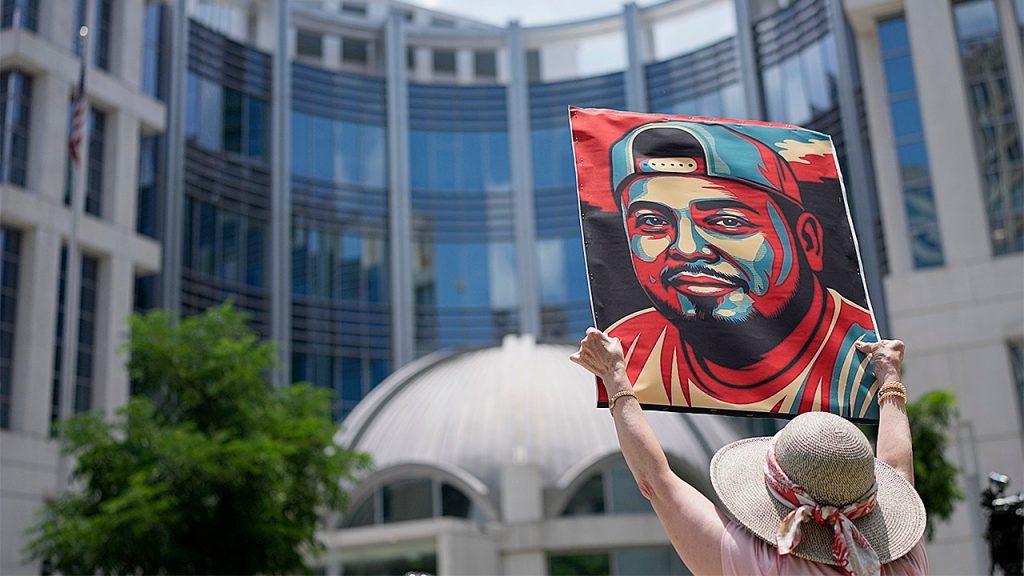The Kilmar Abrego Garcia Case: A Symbol of America’s Immigration Battle
In the complex landscape of American immigration policy, few cases have garnered as much attention as that of Kilmar Abrego Garcia. This Salvadoran migrant’s legal journey has become a flashpoint in the national debate over immigration enforcement under the Trump administration. After a six-month legal battle spanning two continents and involving three federal judges in Tennessee and Maryland, Abrego Garcia now faces imminent deportation to Uganda. On Monday, he is expected to report to the ICE Field Office in Baltimore, where authorities plan to arrest and remove him from the country. This development marks the latest chapter in a saga that has polarized opinions and highlighted the human elements at the center of America’s immigration policies.
The case presents two starkly different narratives about who Kilmar Abrego Garcia truly is. Department of Justice officials claim he is a member of the notorious El Salvadoran gang MS-13, alleging he was caught in Tennessee driving a van full of undocumented migrants and has been accused of domestic violence by his wife. On the other side, Abrego Garcia’s supporters portray him as a hardworking father unfairly targeted by the Trump administration’s aggressive immigration policies. They point to a judge’s previous ruling that found insufficient evidence to support the MS-13 affiliation claim. What makes this case particularly unusual is that Abrego Garcia now faces deportation to Uganda, a third country with which he has no apparent connection, after an immigration judge determined he could not be returned to El Salvador due to dangers he would face there.
The legal maneuvering in recent days adds another layer of complexity to this already intricate case. Just days before his scheduled deportation, the Justice Department offered Abrego Garcia an alternative: plead guilty to criminal charges of human smuggling in exchange for deportation to Costa Rica rather than Uganda. Abrego Garcia declined this offer, a decision his legal team has used to strengthen their motion to dismiss the criminal case against him on grounds of “vindictive” and selective prosecution. His attorneys argue that this plea deal demonstrates a coordinated pressure campaign by multiple government agencies—the Justice Department, ICE, and DHS—forcing their client to choose between pleading guilty and going to Costa Rica or facing “rendition to Uganda.” They further contend that the government’s timing was deliberately punitive, giving him until Monday morning—precisely when he must report to ICE—to accept the plea deal or lose the option forever.
Abrego Garcia’s personal history reveals the human dimension behind the legal proceedings. He entered the United States illegally as a teenager and established a life in Maryland with his wife and children before being deported to El Salvador in March. His family filed a lawsuit claiming his removal violated a 2019 court order that prohibited his deportation to El Salvador. After months of legal battles, the Trump administration returned him to the U.S. in May, only to charge him with human smuggling based on an investigation stemming from a 2022 traffic stop in Tennessee. If ICE proceeds with his immediate arrest upon reporting to the Baltimore field office, the action would likely contradict an order from U.S. District Judge Paula Xinis, an Obama appointee, who sought to prevent such immediate detention. Behind the scenes, reports indicate that DHS and ICE officials, frustrated with Abrego Garcia’s release, have been consulting with Justice Department and ICE lawyers about removing him from the country.
The legal and political dimensions of this case have been further highlighted by strong statements from government officials. DHS Secretary Kristi Noem condemned Abrego Garcia’s release from criminal custody, declaring that the Trump administration “will not stop fighting till this Salvadoran man faces justice and is OUT of our country.” Justice Department lawyers have consistently argued against his release, characterizing him as a danger to the community and a gang member—despite a judge’s ruling earlier this year that rejected this characterization due to insufficient evidence. The case exemplifies the tension between aggressive immigration enforcement priorities and legal protections for due process, raising questions about how the immigration system balances national security concerns with humanitarian considerations and legal rights.
As Abrego Garcia prepares to report to the ICE facility, supporters plan to hold a candlelight vigil outside the Baltimore detention center to show solidarity with him and his family. Lydia Walther-Rodriguez of CASA, an immigrant advocacy group, stated that “Kilmar is being made an example of, a martyr for having the courage to stand up to this administration’s illegal deportation practices.” This characterization underscores how individual immigration cases like Abrego Garcia’s have become symbolic battlegrounds in America’s larger political divisions over immigration policy. Regardless of the outcome, his case illuminates the profound human impact of immigration enforcement decisions and the complex interplay between law, politics, and personal circumstances that shape the lives of millions in America’s immigrant communities.


